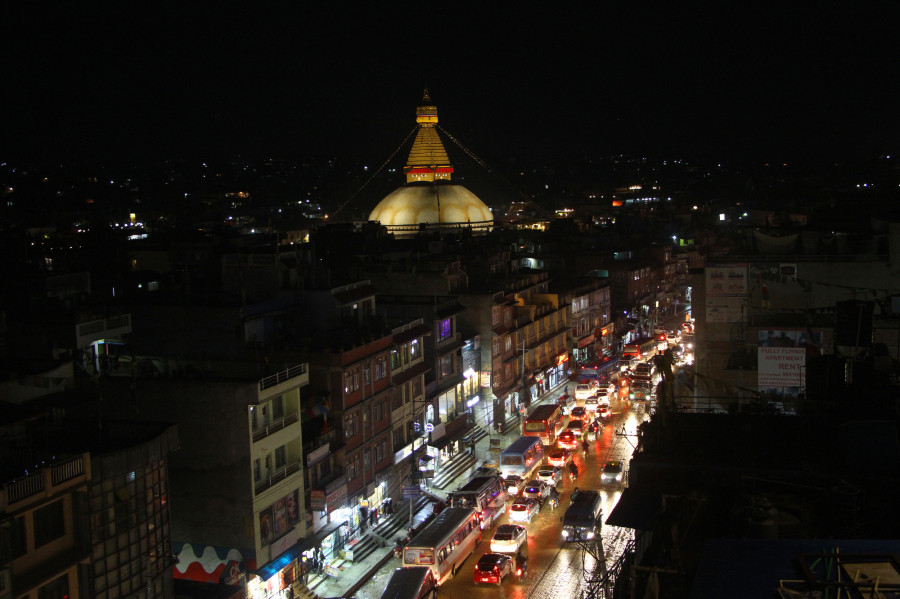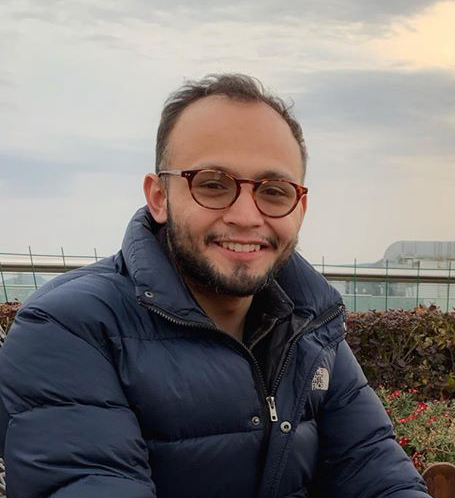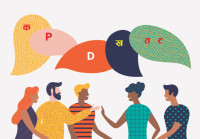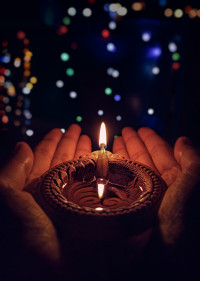As it is
Ruminations about friendship, career and Bouddha
Only after a few years of getting into an Ivy League institution did I realise how big of a leap that was for me and my friend Pawan
Asmod Karki
Sitting in a café in Bouddha, I watch the flags flutter. Soft jazz tunes resonate. Claps of a monk outside the building adds layers to the hums of chants. A brief drizzle has cleared the dust and a strong gust of incense smoke enters the room via two windows facing the stupa towards East—the third one still closed to prevent the raindrops from sliding on the parqueted wooden floor.
Boudha looks like a mandala from the sky—with the dome-shaped stupa at the centre of its own little universe. The ever-fluttering flags and the bells are testaments of the numerous koras I have performed over the course of some years. Some with friends, others mostly on my own. These little walks have provided me respite from the chaotic streets of Kathmandu. As I enter the compounds of Bouddha, a sense of ease pervades. I pick a café that my heart desires and my wallet allows. This time around it is Anjana.
A rambler Asmod has become—you might be thinking. But today, I want to contemplate on friendship and dissect reality. The reality, my friend, is chaotic. So please blame the universe—not me—for this incoherent ramble as I am letting the words flow through me inspired by the monsoon rain. Neither did I plan the rainfall this afternoon nor did I venture to write this one out—yet they both happened.
Breeze
Pawan and I first met around eight years ago, when we were both participants in the Opportunity Funding (OF) programme, organised by USEF Nepal. Pawan and I were two among seventeen high schoolers from Nepal who were selected for the year-long programme that would eventually change the course of our lives. We both got admissions into Ivy Leagues in the US, which had heretofore been reserved for students from certain backgrounds in Nepal. You either had to be an elite or have attended one of the elite institutions, with vast networks abroad, to even make it to these places.
Attending Ivy Leagues as an undergrad for those outside of this elite network is usually an exception—worthy enough to be featured in books. You might want to read the biography of Kul Chandra Gautam, the ex-Deputy Secretary General of the UN, to get an idea of what it is like to get admitted to a place like Dartmouth if you are an outsider to these networks. Yes, times have changed from when he got admitted decades ago, yet the difficulties persist today, in some sense in larger of a magnitude. Yet that is a topic for a separate contemplation.
Only after a few years of getting into an Ivy League institution did I realise how big of a leap that was for me and Pawan. Both of our dads had spent a significant chunk of their lives in the Middle East. Financially, our families were merely fulfilling their basic needs in Kathmandu. Yet we had ended up in two of the most resourceful campuses in the world—and that experience would change our lives.
Pawan and I attending Ivy League colleges carried different meanings to different beings of this universe. I cannot speak for him but for me, it represented a change I was excited to experience. I had learned to immerse in non-curricular books by the end of my time at St Xavier’s in Kathmandu and was quite excited to be in the Firestone Library, the largest one in Princeton. Firestone is one of the largest university libraries in the world and has books on almost anything you could imagine. I was excited to learn about history, philosophy, mathematics, economics, politics and everything and anything. I wanted to explore both the inner and outer world—and for that Princeton provided a platform. For some, my move to Princeton might have signalled a shift in social class. For others, going to Princeton was perhaps a doorway to a stable career in Wall Street.
Three years have passed since I graduated. Pawan is now pursuing his PhD in Physics at Ohio State. I came back to Nepal after a couple of years in China. Pawan struggles to be physically present in the US, as his heart is back in Nepal and with the people of Mustang and Dolpo. During his time in Nepal, he spent around half a year at Crystal Mountain School in Dho-Tarap. The deep bonds he had formed with the students were clearly visible, as we recently visited some of his students in a hostel near Bouddha, when Pawan was back for summer. “Pawan sir” many voiced echoed the stairways of the four-storey building as we climbed to the rooftop canteen. As Pawan and I hung out on the balcony, a student brought water for “Pawan sir” and me.
How many teachers in Nepal treat their students as friends, letting go of the power hierarchy and the desire to dominate that is deeply ingrained in our cultural fabric? Pawan not only treated his students as equals but also treated them with respect. He tried to learn from his students as much as he shared what he knew. The reverence in the students eyes spoke volumes: no amount of fear could elicit such respect, neither could any amount of money buy such heartfelt hospitality.
Mandala
A plane flies past Bouddha with its loud engine noise. After spending a few weeks in Nepal, Pawan recently boarded one such plane. His entire journey from Kathmandu took more than 50 hours. From Kathmandu to Abu Dhabi to Philadelphia to finally to Ohio with long layovers in between.
We met two days before he left. I went to his three-room apartment at Pepsicola. It was the night of the Champions League finals, where Liverpool emerged victorious. Pawan was reminiscing his days inside a football stadium in England, where he had watched a match during his undergrad years. “The vibe is just different in the stadium. It’s hard to explain in words,” he said. I was trying to relate to the best I could.
Before the game started, we took a brief walk around the “town-planning” area in Pepsicola. It was almost eleven at night. Stores were shut—perhaps half of the town had already completed their first REM cycle. We wandered aimlessly. Pawan, me and two other friends. As we walked, we reminded ourselves how fun it was to be in Kathmandu taking such strolls—despite everything. Despite the heavy dust that eternally looms. Despite the early morning sound of a “tipper” truck in the neighbourhood that keeps Pawan’s mom awake at night. Despite the puddles on the street and the web of wires dangling over our heads.
When we Skype or exchange messages in Messenger, Pawan tells how he looks forward to returning to Nepal. The correlation between his passion for physics and the sense of fulfilment that comes out of teaching is minimal. With every single passing hour, he contemplates when and how to return. How to support his family if he returns to Nepal without completing his studies? When would be the right time to return? How to cope with the pressure that our society piles on him to be in the US, complete his PhD and “be someone”?
Pawan does not have answers yet. Neither do I. Yet as I take the last sip from a cup of warm milk at café Anjana, I feel the answer is somewhere out there. The answer is in the sound of the ringing bells. The answer is there among the monsoon clouds that never forget to hover around when the time is due.
Asmod ruminates about life, sips teas, and has endless rounds of conversations. He can be reached at [email protected].




 23.2°C Kathmandu
23.2°C Kathmandu










